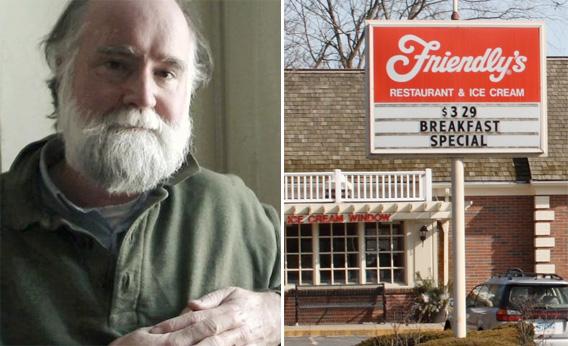When I learned that the Friendly’s restaurant chain may soon file for bankruptcy, I thought right away of Nicholson Baker. This may seem an odd leap: The acclaimed writer—whose most recent book, House of Holes, is subtitled “A Book of Raunch”—is known for defiantly idiocyncratic books, from his stream-of-consciousness narrative about an ordinary lunch hour to a collection of brief snippets concerning WWII that together comprise an argument for pacifism. Friendly’s is probably best known for its grilled cheese sandwich.
But a recent profile by Katie Roiphe mentioned that Friendly’s was one of the places Baker wrote House of Holes—and somehow this makes perfect sense: Though his style can be gloriously elaborate (see, e.g., sentence B in this blog post by book critic Sam Anderson) his outlook is nonetheless entirely unpretentious. The Mezzanine, his debut, includes long passages about straws and shoelaces, for instance. (It also includes, in an extensive digression about paper towel dispensers, a mention of Friendly’s.) And, in fact, Baker’s occasionally rococo style is perhaps not at all inappropriate to a place where one can have for lunch or dinner a Fribble and a Fishamajig.
So I emailed Baker with the news. He sent me this reply:
What sad news about Friendly’s. I happened to be at the Dover Friendly’s this Saturday. Hadn’t been there in a while, but the waitress remembered that I liked the booth in the corner. I usually have breakfast, or a cheeseburger, cole slaw, and coffee—but this time, remembering old traditions, I had a cheeseburger club, which isn’t on the current menu—or maybe I was looking in the wrong place. “We can do that for you,” the waitress said. In the sixties and seventies Friendly’s mostly served its cheeseburgers on toast, not on buns—the toast is what made them so good.
I’ve done many hours of rewriting at Friendly’s. (Also, have to say, at Panera and Starbucks and other places.) I’m always happy when I see the green Friendly’s topiary sign on the Mass Pike. Let’s hope they close some stores and emerge stronger.
That’s still a possibility: Friendly’s is trying to get a loan to keep it afloat so it can sell off assets and recover. But its future is not secure. Friendly’s is “getting squeezed,” like other restaurant chains, “by a continued decline in restaurant revenues and higher food commodity prices.” Some of its problems are more individual: “Restaurants have a life cycle,” says one industry analyst, “and Friendly’s has hit it.” Founded by two brothers in Springfield, Massachusetts, during the Great Depression, it has come to seem increasingly old-fashioned and “out of style” (that analyst again).
In the latest Paris Review, Sam Anderson tells Baker that “the unifying element” in his work “is an instinct for preservation.” To which Baker replies: “Absolutely.” He has preserved in his ecstatic prose fleeting moments and unremarkable phenomena that might, to some, seem utterly banal. Which is probably a fair description of Friendly’s—another feature of recent American life that soon may exist only in its descriptions.
(Further listening: Slate’s Audio Book Club discusses Baker’s 2009 novel, The Anthologist.)
Correction, Oct. 5, 2011: This post originally stated that The Anthologist was published in 2003.
